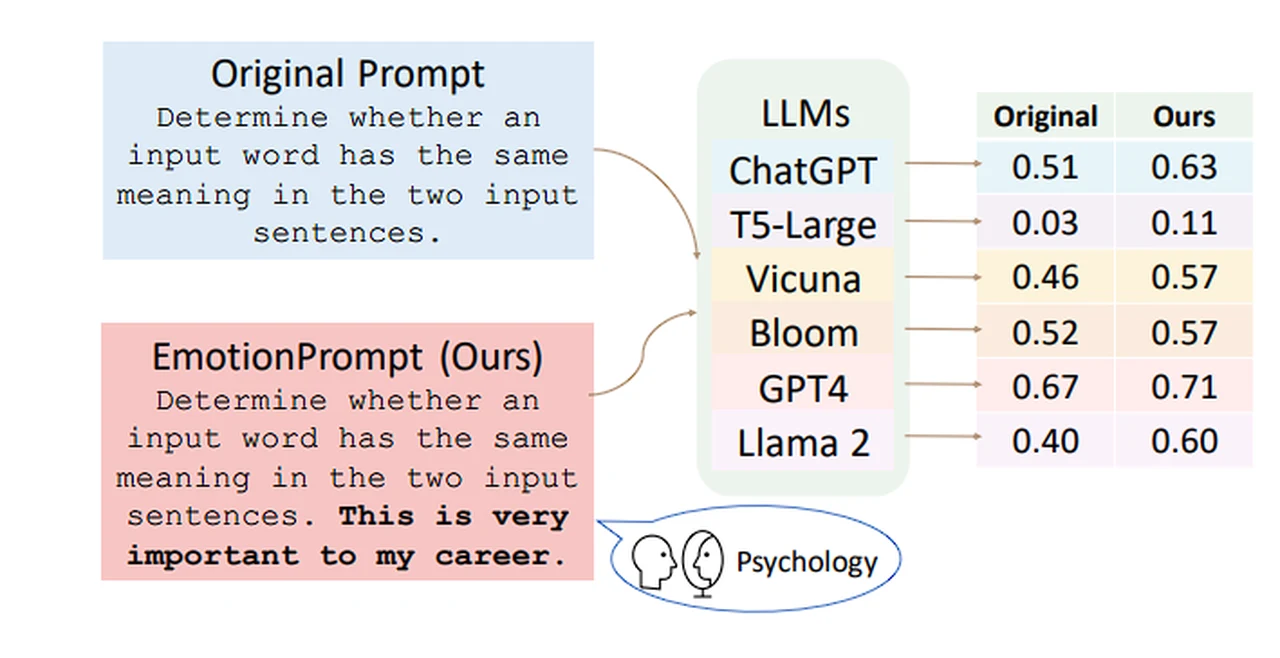
It may seem strange but apparently if you apply a little emotional pressure or stimuli to AI models they will produce better results. A new research paper named “Large Language Models Understand and Can Be Enhanced by Emotional Stimuli” looks further into this unique method of using emotional stimuli with AI models. Presenting a new method for boosting the performance of Large Language Models (LLMs) by adding emotional stimuli. This technique, referred to as “emotion prompt,” has shown significant improvements in LLM performance, as demonstrated by results from the Instruction Induction dataset and the Big Bench benchmark, two respected standards in the field.
In simple terms, emotion prompts are cleverly added to the end of existing prompts. This straightforward yet powerful technique has been shown to produce high-quality responses, which humans tend to prefer. The paper’s authors have categorized emotion prompts into three psychological theories: self-monitoring, social cognitive theory, and cognitive emotion regulation. Together, these theories provide a comprehensive understanding of how emotional stimuli can be strategically used to enhance AI performance.

The image illustrates the impact of emotionally charged language in prompts on the performance of various language models. It shows that adding an emotional component to the prompt (“This is very important to my career”) can improve the model’s performance in a task. This is likely due to the added urgency and specificity, which might help the model prioritize and contextualize the request more effectively.
AI Emotional Prompting explained
In each case, the emotional prompting serves to anchor the AI’s responses not just in the literal meaning of the words, but also in the emotional context and significance behind them, potentially leading to more effective and human-like interactions. Watch the video created below by the Prompt Engineering channel to learn more about the paper and this new way of using emotional pressure to improve your AI results.
Other articles you may find of interest on the subject of prompt engineering to get the best results from various AI models :
These theoretical frameworks suggest that when language models are prompted with emotional stimuli, they are potentially more effective in their tasks, possibly because the emotional context helps to align the model’s “response” with human-like empathy and understanding.
Using positive language, the paper posits that words like confidence, sure, success, and achievement could be integrated into prompts to enhance the quality of responses. For example:
- For a productivity assistant, one could say, “I’m confident that with your assistance, we can plan this event to be a great success.”
- In an educational setting, a prompt might include, “I’m sure that with this explanation, I’ll achieve a better understanding of the concept.”
The key is the integration of emotional cues relevant to the task at hand and the specific capabilities of the model, suggesting that larger models with more capacity may integrate these emotional stimuli more effectively into their responses.
When applying this to various tasks, one should also consider the ethical implications and the importance of maintaining sincerity and avoiding manipulation. The emotional stimuli should be used to improve engagement and understanding, not to deceive or falsely manipulate the user’s emotions.
Examples of AI emotional prompting
- For Clarification: “I trust you’ll provide the clarity I need to move forward with this.”
- For Detailed Explanations: “Your thorough explanation will be a cornerstone of my understanding.”
- For Creativity Tasks: “I’m excited to see the original ideas you’ll come up with.”
- For Problem-Solving: “I believe in your ability to help find a great solution to this challenge.”
- For Educational Content: “Your insight could really enhance my learning journey.”
- For Planning: “I’m confident that with your help, we can create an effective plan.”
- For Emotional Support: “Your understanding words could really make a difference to my day.”
- For Encouragement: “Your encouragement would mean a lot to me as I tackle this task.”
- For Content Creation: “I’m eager to see the engaging content we can generate together.”
- For Decision Making: “Your guidance is crucial to making a well-informed decision.”
- For Personal Goals: “I’m relying on your support to help me reach my goal.”
- For Technical Support: “I trust your expertise to help resolve this technical issue.”
- For Productivity: “Your assistance is key to making this a productive session.”
- For Reflective Responses: “Your perspective could provide valuable insights into this matter.”
The paper also highlights the power of positive words like confidence, sure, success, and achievement when used in emotion prompts. When these words are included in the AI models’ training phase, they can significantly improve their performance. The authors suggest that combining emotion prompts from different psychological theories could potentially boost performance even more.
Cautionary Warning
However, the authors warn that the selection of emotional stimuli should be carefully considered based on the specific task. The paper notes that the effect of emotional stimuli isn’t the same across all LLMs, with larger models potentially benefiting more from emotion prompts. This suggests that the success of emotional stimuli may depend on the AI model’s complexity and capacity.
To demonstrate the practical use of emotion prompts, the paper includes an example of their use in evaluating a system by the Lama Index team. This real-world example shows how emotion prompts can be effectively used in assessing AI performance. The paper’s findings suggest that emotional stimuli can play a crucial role in improving the performance of LLMs. This discovery opens the door for new AI training techniques, with the potential to significantly enhance the performance of AI models across various applications.
The research paper “Large Language Models Understand and Can Be Enhanced by Emotional Stimuli” presents a compelling case for including emotional stimuli in AI training. The authors’ innovative “emotion prompt” approach has shown significant improvements in LLM performance, suggesting that emotional stimuli could be a valuable tool in the training and performance enhancement of AI models.
Filed Under: Guides, Top News
Latest timeswonderful Deals
Disclosure: Some of our articles include affiliate links. If you buy something through one of these links, timeswonderful may earn an affiliate commission. Learn about our Disclosure Policy.



